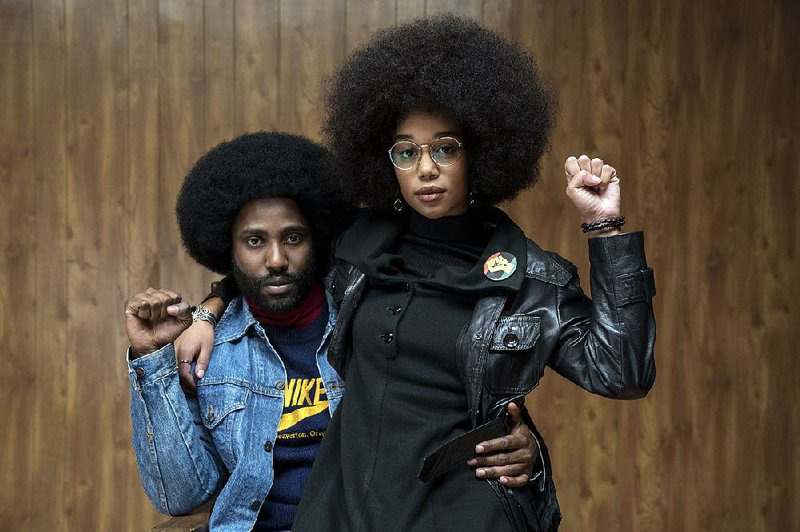We are just about two years into our current presidential regime, and no matter which side of the aisle -- or, more pointedly, which side of the giant, echoing chasm -- you place yourself, we can agree the change has been drastic and far-reaching.
For months now there's been a bemoaning (and not just from me) about the lack of major artistic reaction to what's happening in our country politically, which is particularly strange, given the idea that art tends to have sharper focus and more energy under political oppression than not.
BlacKkKlansman
87 Cast: John David Washington, Adam Driver, Laura Harrier, Topher Grace, Jasper Paakkonen, Corey Hawkins, Ryan Eggold, Michael Joseph Buscemi, Paul Walter Hauser, Ashlie Atkinson, Alec Baldwin, Harry Belafonte
Director: Spike Lee
Rating: R, for language throughout, including racial epithets, and for disturbing/violent material and some sexual references
Running time: 2 hours, 15 minutes
But, with the release a couple of weeks ago of Boots Riley's Sorry to Bother You, and now, Spike Lee's Cannes-approved BlacKkKlansman, we are finally beginning to reap the bitter seeds that have been forcefully sown. Lee's film certainly has a cause, and represents some of his more pointed and indignant work in years, I just wish it were a better actual movie: As it stands, it's more important than actually good.
Based on a true story about a black undercover cop in the '70s, who with the help of a white colleague, successfully infiltrated the Ku Klux Klan chapter in Colorado Springs, and briefly became the confidant of Grand Wizard David Duke, Lee's film has all the material he would ever need, but it's pretty clear he's unsure the best way to utilize it.
He begins the film with a kind of training video, with a spokesman played by Alex Baldwin -- as he so often seems to enjoy -- going against his political persuasion to portray a racist troll, spouting White Power aphorisms and flubbing his lines for this dubious PSA. If you had any doubt of this being a Spike joint, you could safely put those fears to rest.
From there we jump into our story, as rookie cop Stallworth (John David Washington) is trying to make his mark on a police department rife with racism, epitomized by one particularly egregious officer (Faron Salisbury). On a whim, utilizing a kind of inflectionless white voice, he calls a KKK hotline after seeing a classified ad, and is soon connected with chapter president Walter (Ryan Eggold), who is eager to meet this new recruit. Needing a white detective to pull off this magic trick, Stallworth recruits Flip Zimmerman (Adam Driver) to be his white counterpart, and the pair, along with third member Jimmy (Michael Joseph Buscemi) work to ingratiate Flip, a nonpracticing Jew, into the Klan, using Ron's name.
Flip-as-Ron does well with the level-headed Walter, but loose cannon Felix (Jasper Paakkonen) never quite trusts him, and questions him constantly. Undeterred, Ron pushes the team forward as he makes contact with Grand Wizard Duke (Topher Grace), becoming something of a confidant, and meets the beautiful Patrice (Laura Harrier), the president of the local college's Black Student Union, and a fierce supporter of the Black Power movement, who is vehemently anti-cop.
You can sort of see where this is going: Before long, Ron is having to go undercover with Patrice, pretending to be other than a police officer, even as he's continuing his operation against the Klan, where he's also pretending not to be a cop.
Lee makes much of these kind of direct overtures: In one scene midway through, Ron and another cop debate the possibility of Duke eventually running for public office (which he did in a failed bid for the Louisiana governorship in 1991), and ends with Ron concluding there was "no way" the country would ever vote in such a person as president.
Later in the third act, Lee cuts between a ceremonial meeting of the Klan, with Duke presiding; and a meeting of the Black Student Union, with an elderly guest speaker (played by the dignified Harry Belafonte), describing in horrible detail the brutal execution of a developmentally challenged black teen from his hometown, publicly ripped to shreds, and then burned in the town square. Lee wants to equate the enmity even as he differentiates, pointing out the vast gulf between the tribes, and the seemingly unapproachable distance between political POVs, but the scenes play out so overtly, he strips them of some of their power.
Indeed, throughout the film, Lee plays his cards as if he always has the winning hand, and makes moves -- large and small -- that squander the wealth of material he has been granted: With the exception of Walter, he makes the Klan members almost cartoonishly evil -- Felix is a man so twisted up in hatred and fury he's practically unrecognizable as a member of the species (though, sadly, I can't say he's completely out of the realm of possibility at this point in time), and a fat lump named Ivanhoe (Paul Walter Hauser) is a blubbery fool with a gaping rictus of a mouth -- which renders them as far less formidable and horrific than if he'd presented them as more realistic characters.
Ron, too, suffers from Lee's inability to fix his gaze and nail the tone he wants: At moments, he's suffering the racist slings and arrows of the white cop, then getting berated by his black girlfriend, but almost never do you feel his anger become more than a passing moment. He wants to take the Klan down, sure, but the film plays it as if he's in it for as much for departmental glory and acceptance, which again deprives this flame of precious oxygen.
In keeping with his often problematic endings, Lee also spikes the punch bowl with footage from the tragic white power rally in Charlottesville, Va., last year, wherein a group of white supremacists -- many of whom were Klan members and sympathizers -- clashed with protesters and police, before one of their members drove a speeding car into a crowd, killing one woman in the process.
His heart is certainly in the right place, but he only has so much interest in shaping his material and honing down the tone into something powerfully coherent. As it stands, it has so many ideas and convictions flying around at once, the potency becomes diluted: What should be a devastating strike becomes more of a glancing blow.
While I appreciate the attempt, and wish more filmmakers were audacious enough to directly address our country's political situation, you can't help but feel as if this were something of a lost opportunity.
MovieStyle on 08/10/2018

